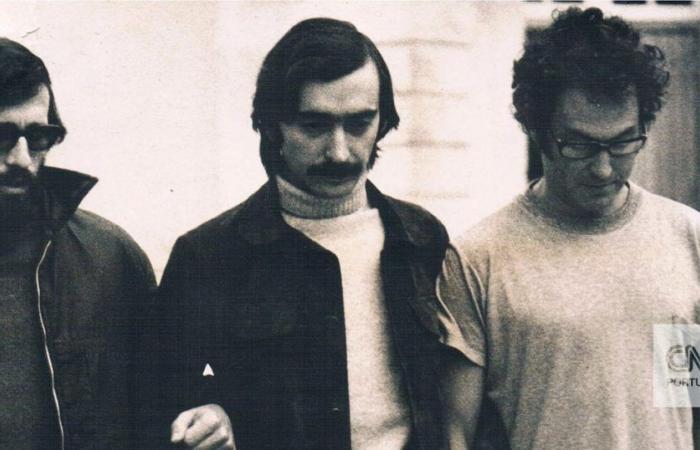
He is one of the voices we hear in the original recording of “Grândola, Vila Morena”, José Afonso’s theme that became a password of the Revolution. Francisco Fanhais tells us what it was like to be an “intervention singer” and how he experienced the arrival of freedom
“In 1986, Zeca was already very ill and was honored in Viana do Castelo, he couldn’t go but I went. The next day, I was at the station waiting for the train, a boy with a scruffy appearance came up and I thought he he came to nag me, and he said to me: ‘you were at Zeca’s party yesterday, weren’t you? I missed the songs. Would you mind taking a message to Zeca? die in the hearts of the young people.’ I was expecting everything except this message. After all, I was always stuck, but not as I expected. new guys. That has been my mission, to keep Zeca’s memory alive, I contribute as much as I can.”
José Afonso died shortly afterwards, aged just 57. His friend and fellow musician Francisco Fanhais is now almost 83 years old. His memory doesn’t fail him. He tells this and other stories with joy and sometimes, in the middle of the conversation, he even sings a verse to show what it was like when they were young and sang together for freedom.
The first time he came into contact with José Afonso’s music was in 1963. He was at the seminary and at a certain point a colleague knocked on his door and gave him “a small record, an EP as they said at the time”. “I know you like music and you’ll like this one”, I told him, leaving him some advice: “But listen quietly.” “The walls actually had ears”, recalls Francisco Fanhais, referring to PIDE, the political police, which controlled everything that was said and could eventually pinch the regime. The album had just come out and had four tracks, including “Os Vampiros” and “Menino do Bairro Negro”, two of Zeca Afonso’s first politicized songs. “I was immediately fascinated by the musical simplicity, that voice, the strength of the poem”, he recalls.
Five years later, already Father Fanhais and also a musician, he was invited by a friend to participate in a musical session that was to take place in the caves of Lapa, in the municipality of Torres Novas, on the night of December 28, 1968. On stage Francisco Fanhais, Jorge Vala, José Amaro and José Afonso passed. The concert was organized by a group of young people with the support of the municipality. “The president of the Chamber, despite being linked to the regime, was a very honest man, and he immediately made it clear: here the PIDE only enters over my dead body”, recalls the musician. The PIDE agent, known locally, made a report explaining the event to his superiors but, in fact, he couldn’t say much because he didn’t enter. “It was a very beautiful concert, full of people from the opposition.”
It was on that night that the friendship between Francisco Fanhais and José Afonso was born, and it was José Afonso who suggested that he participate in the television program “Zip Zip”, which made him known throughout the country. “We met more often, I was in Barreiro, he lived in Setúbal. We were invited to play in recreational societies. At that time I already knew that what interested me in music was getting the message across, fighting against the dictatorship and against the colonial war”, says Francisco Fanhais. One of its best-known themes is the “Cantata da Paz”, based on the poem written by Sophia de Mello Breyner Andresen for the vigil at Capela do Rato, in Lisbon, on December 30, 1972, against the colonial war and in favor of of freedom: “We see, we hear and we read, we cannot ignore it”.
But the authorities “realized that the songs brought together a lot of people and were a strong instrument of the opposition” and began to intervene. “I taught morality classes at the Barreiro high school and was suspended because I spoke about forbidden topics in class. I was also suspended from my duties as a priest because of my internal conflicts with the Catholic Church. And I was also banned from singing by PIDE”, he recalls Fanhais. It was at this point that he decided to accompany José Afonso and his wife, Zélia, who were going to travel to France. “I wanted to breathe new air, see what direction to take with my life. The first person I contacted there was José Mário Branco and I told him: ‘I didn’t come as a tourist, I’m not here to walk around the Latin Quarter, I’m here to do What I can’t do there is sing'”, says Fanhais. He sang for Portuguese emigrants and read programs on radio and television.
“In October 1971, Zé Mário told me ‘let’s record Zeca’s album'”, the album was “Cantigas do Maio”. José Mário Branco, who was the producer, had booked the Strawberry Studios, located in an 18th century castle, in Hérouville, 30 kilometers from Paris, for two weeks. “I essentially participated in ‘O Coro da Primavera’, I’m the one who sings the tenor voice, and I also sing in ‘Grândola, Vila Morena'”, says Francisco Fanhais.
At the time of recording, “Zé Mário, who had been in Alentejo with Giacometti, immediately said that this was an Alentejo fashion and that we should do it with just voices and as if we were a group of workers singing in the street at the end of Labor Day”, he recalls. “We still tried doing the steps in the studio but it didn’t look good, until he found that gravel outside and we went to try. Bóris [o músico Carlos Correia] I wasn’t at that rehearsal, but I was on the day of recording.”
Francisco Fanhais, José Mário Branco and José Anfonso rehearse the steps for the song “Grandola, Vila Morena” (DR – Photography by Patrick Ullmann/ Associação José Afonso)
The rest is history. “Grândola, Vila Morena” was chosen by the military as one of the slogans of the April Revolution and, since then, it has become an anthem to freedom that is still sung today. “We couldn’t imagine, at that time, that the song would gain such important symbolism”, he says. Those steps are the steps of the people, who walk towards freedom. “Those steps immediately became associated with Grândola, they are unmistakable. Just listen to that and we already know what’s coming.”
“Finally we could sing in freedom, let off steam, let go”
Francisco Fanhais found out about the Revolution from a friend, but the news that reached Paris was few and confusing: “The question was whether it was Kaúlza de Arriaga wanting to return to the times of Salazar or whether it was really a democratic revolution, but then we realized that the intervention songs started playing on the radio and we felt more relaxed.” As soon as the borders opened, he felt he had to return to Portugal immediately.
“On the 29th of April I got on the train, I arrived in Vilar Formoso on the 30th in the morning. The station was completely empty except for a corporal who stamped his feet on the floor to warm them up. We opened the windows to breathe the air pure new Portugal. And my traveling companion, jokingly, turns to the corporal and whispers to him: ‘where are the PIDES?’ The boy responds by shouting: ‘Oh friend, speak loudly that this is now a free country’.”
Francisco Fanhais is still moved today by telling this story. “Oh friend, say loudly that this is now a free country”, he repeats, his voice breaking. “Finally, we could speak freely. The country was celebrating, that May 1st was an extraordinary event.”
Fanhais and Zeca decided to volunteer for the cultural promotion campaigns of the MFA – Movimento das Forças Armadas. They went together to the 5th division, on Rua Castilho, and then went together to Bragança, where they spent 15 days with the director Luís Filipe Rocha and the people of the region. “They were very good times, there was joy and a desire to do something for the country”, he says. It was there that Zeca composed the song ‘Em terras de Trás-os-Montes’, with the story of Manuel Augusto, arrested by PIDE, which people from a village told him.”
They toured the country, Francisco Fanhais, José Afonto, Adriano Correia de Oliveira, Vitorino, José Jorge Letria, José Barata-Moura, among others, sang everywhere, especially where there were popular struggles. “Finally we could sing in freedom, let off steam, let go, let out everything we thought”, says the musician.
When the revolutionary years passed, Francisco Fanhais found peace in Alvito, where he has lived for a long time, but is always available to participate in events and go speak at schools – “I love it, especially if they are older because we can already have conversations about values”. He continues to fulfill his mission. On the night of April 24th, he will celebrate 50 years of democracy in Viana do Alentejo, in a concert with other local musicians.
“Let’s see how we can all join forces again so as not to fall into the trap of giving votes to the extreme right”, he says. “We cannot stand by. It was important that in the next elections, people realized that they were voting for a racist and xenophobic program, an anti-democratic program, which is against everything we fought for.”
Tags: friend speak loudly free country Francisco Fanhais sang dictatorship years fold arms
--




